- Home
- Technical Cooperation Projects
- Index of Countries
- Asia
- Mongolia
- Project for Promoting Employment of Persons with Disabilities (DPUB2)
- Project News
- Promoting Job Coach System linking persons with disabilities and companies to Mongolia. <second>
Project news
2023-07-05
Promoting Job Coach System linking persons with disabilities and companies to Mongolia. <second>
Careful consideration learned in the field of employment of persons with disabilities in Japan
In February 2023, government officials, NGOs and private company officials engaged in supporting the employment of persons with disabilities in Mongolia visited Japan and learnt about the employment system of persons with disabilities in Osaka, Japan. Following on from the previous report, we introduce the training.
Visited the first special subsidiary company in the insurance industry
The training participants received explanations from the Osaka City Vocational Rehabilitation Centre, and the Osaka Vocational Center for Persons with Disabilities affiliated by the Japan Organization for Employment of the Elderly, Persons with Disabilities and Job Seekers (JEED), and visited Kashima Yuaikai, the Osaka Prefectural Government and Hello Work Yodogawa to learn about the initiatives of the administration and various support organisations. Among these, it was the initiatives of the private sector that particularly caught the attention of the participants.
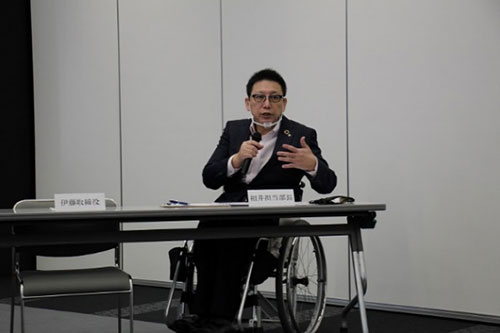 Mr Hiroyuki Aii, General Manager in charge of Operations Department 2 at Nissay New Creation Co., Ltd.
Mr Hiroyuki Aii, General Manager in charge of Operations Department 2 at Nissay New Creation Co., Ltd.
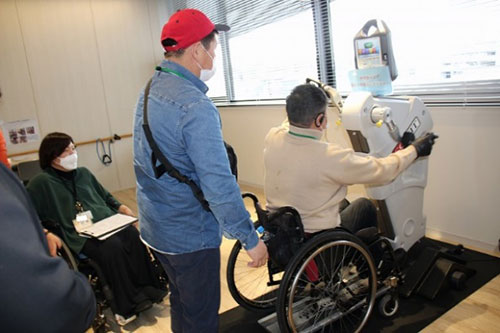 A stretching area in one corner of the company is equipped with wheelchair-accessible machines.
A stretching area in one corner of the company is equipped with wheelchair-accessible machines.
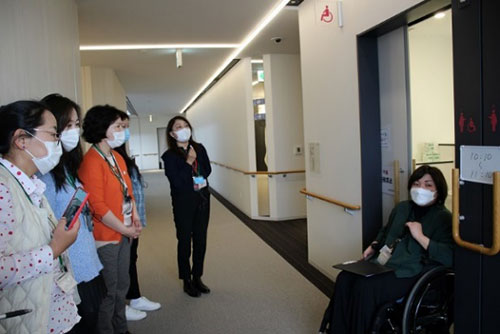 Trainees marvelling at the various well-designed toilets
Trainees marvelling at the various well-designed toilets
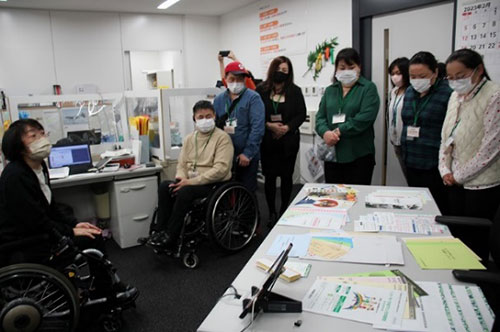 The company provides printing and binding services on behalf of Nippon Life Insurance Company.
The company provides printing and binding services on behalf of Nippon Life Insurance Company.
Nissay New Creation Co., Ltd. (hearafter “Nissay New Creation”), which we visited, was established in 1993 as a wholly-owned subsidiary of Nippon Life Insurance Company. As the first special subsidiary company in the insurance industry. Persons with disabilities employed by Nissay New Creation are deemed to be employed by the parent company, Nippon Life Insurance Company. At the time of its establishment, the company started with 25 employees with disabilities, but today, 356 of the total 408 employees have some form of disability (as of April 2022). The company is entrusted by Nippon Life Insurance Company to carry out insurance-related administrative work on its behalf, printing and binding, as well as operating a convenience store in its head office and producing handmade paper. 90% of its employees work on Nippon Life Insurance Company’s dedicated terminals to carry out other insurance-related administrative work on behalf of the company, such as registering their Individual Numbers and checking and working on documents related to insurance administration. When the company was founded, it employed mainly persons with physical impairments such as limb and hearing, but in recent years, it has hired more persons with mental, developmental and intellectual disabilities.
Training participants received a company overview from Mr Hiroyuki Aii, General Manager of Operations Department 2, before being divided into two groups for a company tour. The tour was interesting to see corridors designed to be wide enough for wheelchair users to easily pass each other and turn corners, indoor stairs with ramps to push wheelchairs up and down in an emergency, and ramps attached along the exterior walls to allow wheelchair users to evacuate on their own.
In particular, the relaxation space with semi-private working chairs surrounded by side panels for employees who are stressed by the stares and voices of others around them, the stretching corner with machines that can be used while seated in a wheelchair, and the universal vending machines were all meticulously considered. Training participants could not hide their amazement at the attention to detail, and actually tried sitting in the chairs and touching the machines themselves. When Mr Aii explained that the 31 wheelchair-accessible toilets in total have signs to show availability from a distance, are designed so that people can move from their wheelchairs to the toilet seat from either side, and are air-conditioned for persons with spinal cord injuries, whose body temperature is difficult to regulate, they all voiced their admiration.
Questions asking about criteria for hiring persons with disabilities and their business interests
The Q&A session that followed the inspection was attended by the company's employees involved in HR-related work, including the aforementioned Mr Aii, as well as the CEO, Mr Nobuya Amabe.
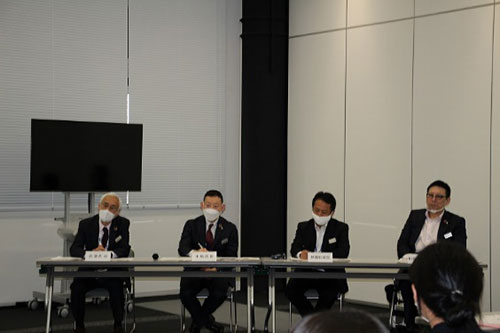 The CEO, Mr Nobuya Amabe was also present for the Q&A session.
The CEO, Mr Nobuya Amabe was also present for the Q&A session.
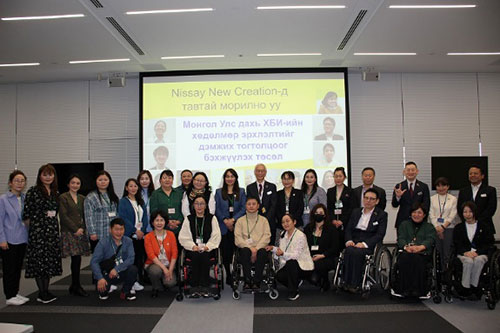 Commemorative photo with the employees who showed us around.
Commemorative photo with the employees who showed us around.
For example, when asked, “Is it intentional that the number of employees with and without disabilities in the managerial class is evenly split, or did it happen by chance?” the response was, “Initially, all the executives were seconded from Nippon Life Insurance Company, but as employees grew within the company, it has now become an even split”. Furthermore, when asked, “How many job coaches are there within the company?” the answer was, “We have approximately 70 vocational counselors for persons with disabilities who are available for consultation if needed, with 17 of them being company-based job coaches. In general, supervisors provide support and guidance, but if a solution cannot be found, job coaches intervene and facilitate environmental adjustments”.
Another question was raised: “What do you think is an effective approach to encourage companies to employ persons with intellectual disabilities?” In response to the question, it was introduced that “Currently, we have 59 employees with intellectual disabilities, and they are all dedicated and valuable assets to our workforce”. Then, it was suggested, “While it may take time to understand persons with intellectual disabilities, explaining that once they are employed, they show gratitude and work diligently might be beneficial”.
When asked about the business benefits of employing persons with disabilities, it was firmly stated, “While it is true that there are special subsidiary companies that employ persons with disabilities to protect the interests of large corporations and meet the statutory employment rate, we take a direct approach to hiring persons with disabilities and pride ourselves on striving for that goal as a company”.
Furthermore, when a wheelchair user participant asked, “I obtained an accounting qualification in Mongolia nine years ago, but I couldn't find a job where I could utilize my expertise. Unfortunately, in Mongolia, there is still a situation where judgments are based on appearance rather than abilities. In your company, what criteria do you set when hiring persons with disabilities?” the response was, “We follow the vocational readiness pyramid, which comprehensively assesses the individual’s living situation, motivation for work, and the extent to which they accept their disability and can communicate it to others. We particularly emphasize whether the individual has accepted their disability, as it is crucial for the proper consideration of their needs by the surrounding environment”.
Nissay New Creation's company-wide commitment to employing persons with disabilities seemed to have touched the hearts of the trainees, and the group's verbal exchange of impressions on the bus on the way home showed that they had received a lot of stimulation.
Creating training programs during the COVID-19 pandemic was a challenging endeavor
The training schedule was organised by Mr Daisuke Sakai, Executive Director of Kashima Yuaikai and Director of the Kashima Centre for Persons with Disabilities.
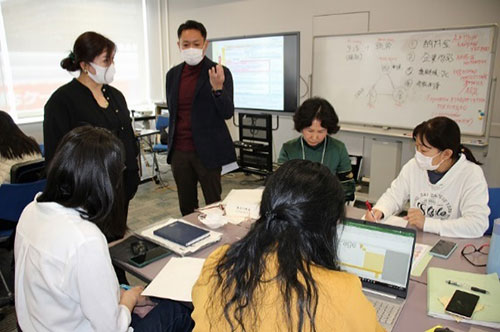 Mr Daisuke Sakai (man at the back of the photo) advises trainees in their groups on the direction of discussion.
Mr Daisuke Sakai (man at the back of the photo) advises trainees in their groups on the direction of discussion.
Mr Sakai, who has worked for Kashima Yuaikai for about 25 years, has a particular sense of mission for the work support services for persons with disabilities, and continues to focus on it with a strong personal commitment, even now that he has been forced to take on administrative duties as a manager. He has been involved in international cooperation projects since 2007, when he was fortunate enough to participate in a JICA project in Malaysia to support the employment of persons with disabilities and has also participated in DPUB2 as a short-term expert. Speaking about the satisfaction of international assignments, he mentioned, “It is refreshing to communicate with people from different countries, with employment support as a keyword. It not only provides an opportunity to explain Japan’s progress and challenges but also helps me organize my own thoughts about Japan's future”.
Regarding this training program, they expressed their intention to schedule visits to various companies of different industries and sizes, aiming to provide exposure. They had been coordinating with several companies that cooperate with on-the-job training as part of their job coach training program. However, due to the unfortunate impact of the COVID-19 pandemic, many companies have shifted to remote work, resulting in only one company, Nissay New Creation being selected as the observation destination. While acknowledging the need for adjustments from their initial expectations and understanding that the trainees would have preferred to visit more companies, Mr Sakai expressed, “It was good that they were able to see Nissay New Creation, which particularly pays attention to considerations for persons with physical disabilities and has well-equipped facilities”.
Meanwhile, visits to support organizations were limited to Kashima Yuaikai due to insufficient capacity to accept the training. Originally, He wanted to show how support organisations, including the Osaka City Vocational Rehabilitation Centre and the Osaka Vocational Center for Persons with Disabilities, which were invited to give lectures, are providing thorough support, from assessment to sending the person out for employment, and then supporting the person to settle in afterwards.
In addition, it was a deliberate decision in the schedule to have them observe government initiatives. They emphasized, “In order to promote employment for persons with disabilities, it is crucial for the government, which sets the statutory employment rate, to lead by example. That’s why we wanted them to see the efforts of the Heartful Office in Osaka Prefectural Government”. They also expressed their hope by saying, “Through this observation, we hope that employment for persons with disabilities will progress in the Ministry of Labour and Social Protection of Mongolia”.
Mr Sakai said enthusiastically, “Now that DPUB2 has passed the turnaround, we want to meet with you as much as possible to understand what challenges you are facing and what you are struggling with. Although I was involved in the Malaysian project for only a few years, I am still connected with the people involved because we are both in the field of employment support. I hope that the job coach system can take root in Mongolia and we can have a long-lasting relationship”.
Job coach methodology that works across language barriers
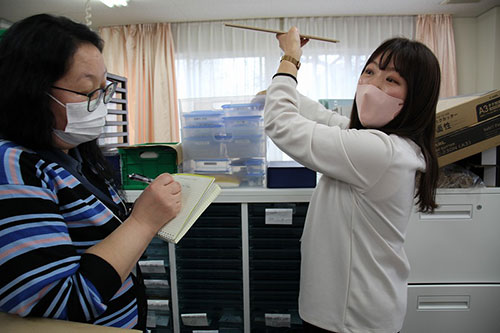 Ms Yumiko Tamashiro (right), who worked as a part-time support staff for outing assistance at Kashima Yuaikai during her student days, then continued on to employment and obtained the qualification as a job coach. Currently, she serves as the support section manager at Link.
Ms Yumiko Tamashiro (right), who worked as a part-time support staff for outing assistance at Kashima Yuaikai during her student days, then continued on to employment and obtained the qualification as a job coach. Currently, she serves as the support section manager at Link.
The person who worked with Mr Sakai to plan the site of the inspection and actually made the appointment was the aforementioned Ms Yumiko Tamashiro, who is the support section manager at the Kashima Centre for Persons with Disabilities Link (hereafter “Link”).
Since her student days, Ms Tamaki has worked part-time as a guide helper at Kashima Yuaikai, assisting persons with intellectual disabilities and hearing impairments on outings, and gradually began to think that “shopping alone is not really participating in society” and that “we can only truly participate in society when we are also on the production side, not just the consumption side”. During that time, Ms Tamashiro developed a strong interest in the field of job coaching after coincidentally coming across an article about the systematization of job coaching in a newspaper. When she consulted with Kashima Yuaikai about this newfound interest, she was introduced to Mr Sakai. This encounter became a turning point for her, as she graduated from vocational school and joined Kashima Yuaikai, obtaining the qualification as a job coach. In 2006, when Link was established, Ms Tamashiro became a job coach affiliated with Link, dedicating herself to supporting the employment of individuals with disabilities.
For the past 13 years, Ms Tamashiro has been involved in JICA’s training program under Mr Sakai’s guidance. She has experience in coordinating training schedules and visits for participants from Malaysia and Jordan who participated a training in Japan in the field of disability employment. One aspect she always looks forward to is the presentation of the action plans held at the end of the training. It is an opportunity for participants to reflect on their visits and lectures and showcase their determination on how to apply their learnings to their work upon returning to their home countries. Ms Tamashiro finds it fascinating because she can observe how different their perspectives are based on factors such as each country’s culture, social security systems, historical context including colonialism, and even recent conflicts.
Regarding job coaching, she proudly expresses, “By directly speaking with individuals in companies and approaching the work environment head-on, we can eliminate the barriers faced by persons with disabilities. I believe there is no other support that is as quick and effective as this. It is exactly the form of support that I envision and idealize”. Over the past decade, her responsibilities as a manager at Link, including talent development, have increased. She enthusiastically shares, “Witnessing how the theories and methodologies of job coaching transcend language barriers in different countries, I have grown to love this profession even more. I am fortunate to continue being involved in a job that I truly adore”. Her face beams with happiness as she speaks.
It is not easy to organise a training schedule to receive people from overseas who are active on the front lines of various industries and to have them understand Japanese systems and initiatives efficiently. Needless to say, it is essential to have the full cooperation of an organisation that has a network of contacts in a wide range of sectors, from business to government, with whom it is possible to build relationships on a daily basis and to ask them to accept visits, so that the training participants who come to Japan with their daily work can learn a lot in a limited schedule. This is supported by the strong feelings and sense of mission that each of the hosts holds in their hearts.
- About JICA
- News & Features
- Countries & Regions
- Our Work
- Thematic Issues
- Types of Assistance
- Partnerships with Other Development Partners
- Climate Change / Environmental and Social Considerations
- Evaluations
- Compliance and Anti-corruption
- Science and Technology Cooperation on Global Issues
- Research
- JICA Development Studies Program / JICA Chair
- Support for the Acceptance of Foreign HRs / Multicultural and Inclusive Community
- Publications
- Investor Relations
